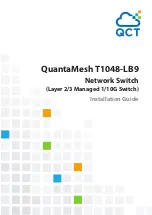
Configuration Guide
802.1x Configuration
Figure 0-7
Configuring On-line Probe on Client End
To ensure accurate charging, an on-line probe mechanism is needed to detect whether a user is on-line within a short
period. The re-authentication mechanism specified in the standard can meet such needs, but it needs the participation of
the RADIUS server. Accurate user probe will occupy enormous resources of the switch and RADIUS server. To meet the
need to implement accurate charging with few resources occupied, we use a new client on-line probe mechanism. Such
mechanism only needs interaction between the switch and client and occupies little network traffic, and it implements
minute-level charging accuracy (you can set the charging accuracy).
To implement on-line client monitoring, the client software must support this function.
The following two timers affect the performance and accuracy of on-line probe:
Hello Interval: It is the interval at which the client sends advertisement.
Alive Interval: Client online interval. If the device has not received the client advertisement during this interval, it
actively disconnects the client and notifies the billing server. The interval must be greater than the Hello Interval.
In the privileged EXEC mode, you can configure the on-line probe function of the client by performing the following steps:
Command
Function
Ruijie(config)#
dot1x client-probe enable
Enable the on-line probe function of the client
Ruijie(config)#
dot1x
probe
-
timer
interval
interval
Configure the Hello Interval
Ruijie(config)#
dot1x
probe
-
timer
alive
interval
Configure the Alive Interval of the device.
Ruijie#
show dot1x
Show the configuration.
Configuring the Option Flag for EAPOL Frames to Carry TAG
In accordance with IEEE 802.1x, the EAPOL packets cannot be added with vlan TAG. However, based on the possible
application requirements, the selection flag is provided. When the flag is turned on, tags can be outputted according to the
related output rule of the trunk ports.
The typical application environment is to enable 802.1x authentication on the convergence layer. For more information,
see “Topologies of Typical Applications”.
Summary of Contents for RG-S2900G-E Series
Page 1: ...RG S2900G E Series Switch RGOS Configuration Guide Release 10 4 2b12 p1 ...
Page 91: ...Configuration Guide Configuring PoE Configuration ...
Page 133: ...Configuration Guide EEE Configuration ...
Page 319: ...Configuration Guide QinQ Configuration ...
Page 408: ......
Page 409: ...IP Routing Configuration 1 Static Route Configuration ...
Page 412: ......
Page 413: ...Multicast Configuration 1 IGMP Snooping Configuration 2 MLD Snooping Configuration ...
Page 757: ......
Page 758: ...ACL QoS Configuration 1 Access Control List Configuration 2 QoS Configuration ...
Page 801: ...Reliability Configuration 1 RLDP Configuration 2 TPP Configuration 3 SEM Configuration ...
Page 901: ...Configuration Guide ERSPAN Configuration ...
Page 902: ...Web based Configuration 1 Web based Configuration ...
















































